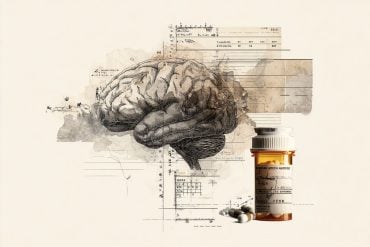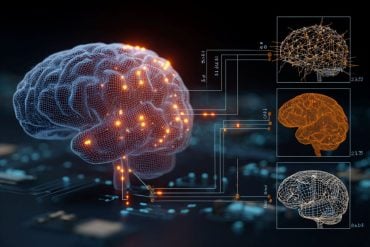Summary: Psilocybin can restore mGluR2 levels in the prefrontal cortex, and this leads to a reduced risk of relapse for those with alcohol use disorder.
Source: CIMH
Current research results uncover the unknown potential of psilocybin to restore molecular circuits in the brain and thus contribute to a reduction of relapses in alcohol dependence. This could lead to new therapeutic approaches.
Alcohol dependence is one of the most common neuropsychiatric diseases. In Germany, more than five million people are affected. The consequences are often severe physical and mental suffering and a high mortality rate. The average life expectancy of those affected is reduced by more than 22 years.
Despite the severity of the disease, whose chronic course is characterized by frequently recurring relapses into excessive alcohol consumption and great suffering pressure for those affected, we still know little about the causal mechanisms in the brain.
Cortical mGluR2 deficit as a pathological molecular mechanism of altered behavior in addiction
Mental processes that control behavior, attention and emotions are known as executive functions. In many psychiatric diseases, the ability to control one’s own thoughts and actions and to regulate emotions are disturbed, for example in attention deficit hyperactivity disorder (ADHD), autism, schizophrenia, borderline syndrome and also in addiction.
In a multidisciplinary, international collaboration led by Dr. Marcus Meinhardt, Prof. Dr. Rainer Spanagel and Prof. Dr. Wolfgang Sommer (all at the Central Institute of Mental Health in Mannheim), the molecular mechanism of altered executive functions and increased relapses in alcohol dependence have been investigated.
The research focuses on the role of the metabotropic glutamate receptor 2 (mGluR2). In the brain, this receptor works as an antenna for the neurotransmitter-glutamate and regulates its release in various brain areas.
In their current work, which has now been published in the journal Science Advances, the research team shows a causal link between a reduced mGluR2 function within the brain region of the prefrontal cortex in alcohol-dependent rodents and an impaired executive control as well as craving for alcohol. mGluR2 activation has thus been identified as a potential therapeutic mechanism in alcohol dependence.
Psilocybin restores the production of mGluR2
Hallucinogenic substances such as psilocybin—the active ingredient in the so-called magic mushrooms—or LSD act on serotonin 2A receptors (5-HT2AR) in the brain. These receptors are present in large numbers in the prefrontal cortex.
Previous research has shown that 5-HT2AR and mGluR2 can form a functional complex. This complex has been linked to the mechanism of action of psychedelics, but the molecular functions of this complex in addiction were previously unknown.
“We were able to show that psilocybin can restore mGluR2 levels which leads to a reduction in relapses to alcohol,” says Marcus Meinhardt. Thus, this research opens up the possibility of developing new therapeutic approaches that focus on psilocybin as a driver of mGluR2.
About this psychopharmacology research news
Author: Press Office
Source: CIMH
Contact: Press Office – CIMH
Image: The image is in the public domain
Original Research: Open access.
“Psilocybin targets a common molecular mechanism for cognitive impairment and increased craving in alcoholism” by Marcus W. Meinhardt et al. Science Advances
Abstract
Psilocybin targets a common molecular mechanism for cognitive impairment and increased craving in alcoholism
Alcohol-dependent patients commonly show impairments in executive functions that facilitate craving and can lead to relapse. However, the molecular mechanisms leading to executive dysfunction in alcoholism are poorly understood, and new effective pharmacological treatments are desired.
Here, using a bidirectional neuromodulation approach, we demonstrate a causal link between reduced prefrontal mGluR2 function and both impaired executive control and alcohol craving. A neuron-specific prefrontal mGluR2 knockdown in rats generated a phenotype of reduced cognitive flexibility and excessive alcohol seeking.
Conversely, virally restoring prefrontal mGluR2 levels in alcohol-dependent rats rescued these pathological behaviors. In the search for a pharmacological intervention with high translational potential, psilocybin was capable of restoring mGluR2 expression and reducing relapse behavior.
Last, we propose a FDG-PET biomarker strategy to identify mGluR2 treatment-responsive individuals. In conclusion, we identified a common molecular pathological mechanism for both executive dysfunction and alcohol craving and provided a personalized mGluR2 mechanism-based intervention strategy for medication development for alcoholism.






